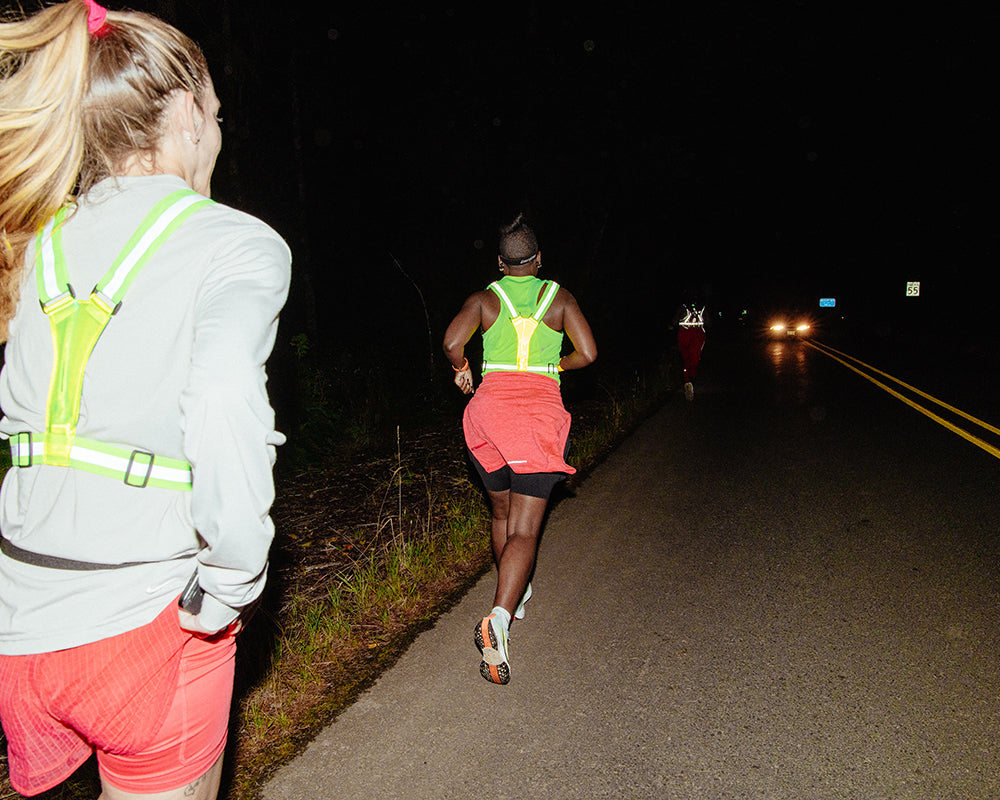
The Non-Routine for Mental Clarity
|
|
Jes Woods is an ultra runner and Nike running coach who thrives on working towards big goals—and helping others achieve theirs. Here she shares how she achieves consistency and stays locked in to her process, finding calm in the chaos, despite a demanding job and busy schedule.
My routine is...I have no routine. Some days, my schedule means waking up at 5.30 a.m. to coach a 7 a.m. track session. Other days, it might mean staying up well past my bedtime for a late night power hike on the treadmill because that's the only time I could fit it in. I love my job(s) and I am grateful to be a running coach in New York City, engaging with hundreds of unique runners weekly, so I embrace the controlled chaos and wouldn't change it for the world. I have learned the hard way, through trial and error (and error again), that this kind of coaching and personal running schedule requires more than simply grinding it out to get the job done well.
The recipe for optimal recovery is nothing fancy when you boil it down to its most basic form: it’s sleep and blood flow. I have enough recovery gadgets to help with muscular recovery and blood flow, but sleep is always the area where I could use the extra help when trying to get the rest of my body and mind to recover.
Throughout a season, I often find myself either surviving my own ultra marathon or helping a runner with their bucket list ultra. Whether you're running, crewing, pacing, or volunteering at an ultra marathon, sleep deprivation is inevitable. Managing it is a key part of success. With Moab 240 (a 240-mile ultramarathon in Moab, Utah), I slept 2.5 hours across four days. And when crewing Hood to Coast (a 196-mile running relay that starts at Mount Hood in Oregon and ends at the Pacific Ocean) recently, I bounced from van to van helping each of the runners get ready for their leg of the relay over the course of 27 hours.
That level of sleep deprivation is, of course, not recommended on a regular basis, but it is a necessary evil and part of your race strategy in endurance running events. And, let’s face it, sleep deprivation is something we all face at one time or another, whether as new parents or perhaps during a particularly demanding or stressful time at work.
The compounding fatigue after these events requires more than just "a good night's rest" in order to bounce back. It affects both my physical and psychological well-being for several days (on average, it takes me about six days after a 100-mile mountain trail race to feel recovered).
When I’m doing all I can to get my body (and mind) back on a natural sleep-wake cycle I’ll use Brain Drive and Elite Sleep. I’m not just looking for sleep duration during this time, I’m also wanting to get the best sleep quality I possibly can. I’ve found Elite Sleep really does help me with this.
Even after five to six days of normal sleep patterns, fatigue and mental fog can still persist. I’ve noticed cognitive functions like decision-making and basic reaction times are impaired. I feel like the psychological effects of sleep deprivation aren't talked about enough, like mood swings or even depression.
It’s here that I’ve really noticed the benefits of Omega-3. With a slew of scientifically backed benefits for daily use, I try to make a concerted effort to take them when bouncing back from ultra weekends. They can benefit the brain by helping with better mental processing (like the ability to follow a trail map at 3 a.m. on three hours of sleep), support better emotional regulation (like combatting depressive thoughts during long, lonely stretches), and help improve cerebral blood flow for maintaining mental alertness (like quickly remembering what to do if you cross paths with a bear!).
Prioritizing brain health and not just fixating on the physical training is mission critical for me—and I’m sure that’s something many people can identify with, no matter your goal or activity of choice. My coaching and running schedule may not be conducive to a consistent routine, but knowing this and preparing for it by staying consistent with my own daily habits is one routine I can commit to.